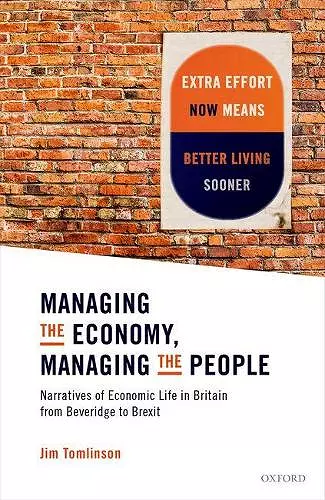Managing the Economy, Managing the People
Narratives of Economic Life in Britain from Beveridge to Brexit
Format:Hardback
Publisher:Oxford University Press
Published:5th Oct '17
Currently unavailable, and unfortunately no date known when it will be back

This study offers a distinctive new account of British economic life since the Second World War, focussing upon the ways in which successive governments, in seeking to manage the economy, have sought simultaneously to 'manage the people': to try and manage popular understanding of economic issues. In doing so, governments have sought not only to shape expectations for electoral purposes but to construct broader narratives about how 'the economy' should be understood. The starting point of this work is to ask why these goals have been focussed upon (and differentially over time), how they have been constructed to appeal to the population, and, insofar as this can be assessed, how far the population has accepted these narratives. The first half of the book analyses the development of the major narratives from the 1940s onwards, addressing the notion of 'austerity' and its particular meaning in the 1940s; the rise of a narrative of 'economic decline from the late 1950s, and the subsequent attempts to 'modernize' the economy; the attempts to 'roll back the state' from the 1970s; the impact of ideas of 'globalization' in the 1900s; and, finally, the way the crisis of 2008/9 onwards was constructed as a problem of 'debts and deficits'. The second part of the book focuses on four key issues in attempts to 'manage the people': productivity, the balance of payments, inflation, and unemployment. It shows how, in each case, governments sought to get the populace to understand these issues in a particular light, and shaped strategies to that end.
Fascinating new book by the economic historian Jim Tomlinson ... The reader is led through a detailed study of all the political-economic issues that successive post-war governments have faced ... The result is a significant contribution, not only to the study of popular understanding of the economy, but to the wider history of the political economy in modern Britain. * Christopher Godden, Times Literary Supplement *
This book is an excellent read regarding British economic history from 1942 to 2016. The factual information presented is of great significance to British citizens and anyone interested in future progress ... Highly recommended. * CHOICE *
...this is a most useful addition to undergraduate and graduate reading lists. * Duncan Needham, The English Historical Review *
ISBN: 9780198786092
Dimensions: 241mm x 168mm x 24mm
Weight: 580g
288 pages